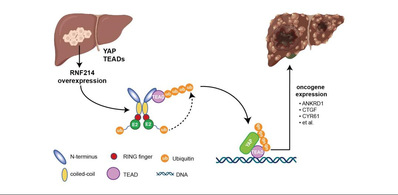On June 12, 2024, Dr. Jianping Jin 's group from Life Sciences Institute of Zhejiang University and Dr. Yunqing Qiu's group from the First Affiliated Hospital of Zhejiang University jointly published a research article in Nature Communications entitled The RNF214-TEAD-YAP signaling axis promotes hepatocellular carcinoma progression via TEAD ubiquitylation. This study proved for the first time that the ubiquitin ligase RNF214 is a new important factor in the Hippo signaling pathway, forms the RNF214-TEAD-YAP signaling axis, then upregulates the transcriptional activity of the YAP-TEAD complex, and ultimately promotes tumorigenesis.

Molecular mechanism of ubiquitin ligase RNF214 promoting hepatocellular carcinoma progression
Primary liver cancer is the sixth most common malignant tumor in the world and the third leading cause of cancer-related death, with a 5-year survival rate of only 18%. In 2020, approximately 906,000 people were newly diagnosed with liver cancer worldwide, and as many as 832,000 people died from liver cancer. The incidence and mortality rates of liver cancer are similar, indicating that the prognosis of liver cancer is extremely poor and patients do not benefit well from existing treatments. Ubiquitylation is one of the main processes of protein post-translational modifications in eukaryotes. Ubiquitylation is a specific enzyme-catalyzed process, and the specificity of its substrate proteins is mainly determined by ubiquitin ligases.
RNF214 is a RING finger ubiquitin ligase, but its biological function has not been characterized previously. Dr. Jianping Jin’s group and Dr. Yunqing Qiu’s group took the joint efforts and reported for the first time that RNF214 is an oncoprotein in liver cancer. They found that RNF214 is overexpressed in liver cancer tissues and is critical for liver tumorigenesis. Using an APEX2-mediated proximity labeling method and protein mass spectrometry technology, they further identified the TEADs family proteins, an important group of transcription factors in the Hippo signaling pathway, as the main interacting proteins of RNF214. Biochemical and genetic analyses showed that RNF214 conjugates a non-proteolytic polyubiquitin chain on the single lysine residue in the YAP-interactive domain of TEADs at their carboxyl terminus, and promotes the formation of the YAP-TEAD transcription complex, thereby positively regulating the transcription of downstream target genes in the Hippo signaling pathway. This study showcased for the first time that YAP and TAZ have polyubiquitin chain-binding ability, providing the key evidence for the function of ubiquitylation in regulating the transcriptional activities of the YAP-TEAD transcription complex. Moreover, this study demonstrated the important biological function of ubiquitin ligase RNF214 in the hepatocellular carcinoma tumorigenesis, and provided a new perspective regarding the roles of the Hippo signaling pathway in liver cancer. The study further showed that inhibiting the activity of RNF214 can greatly reduce the transcriptional activity of the YAP-TEAD complex, thereby preventing the tumorigenesis of liver cancer, indicating that RNF214 is an alternative and promising drug target to develop novel therapeutic means in liver cancer treatment.
Dr. Mengjia Lin, a postdoctoral fellow in Dr. Jianping Jin 's laboratory, is the first author of this article (Mengjia Lin was a PhD student jointly advised by Drs. Jianping Jin and Yunqing Qiu). Drs. Jianping Jin and Yunqing Qiu are the co-corresponding authors. Other coauthors in this study include Xiaoyun Zheng, Jianing Yan, Fei Huang, Yilin Chen, Ran Ding, Jinkai Wan, Lei Zhang, Chenliang Wang, Jinchang Pan, Xiaolei Cao, Kaiyi Fu and Yan Lou. This work has received strong collaborative support from laboratories of Drs. Xin-Hua Feng, Bin Zhao, Junfang Ji, and Li Shen from Life Sciences Institute of Zhejiang University, Dr. Lan Fei from Fudan University, and Professor Xianglei He from the Department of Pathology of Zhejiang Provincial People's Hospital. This study was funded by the National Natural Science Foundation of China and the Ministry of Science and Technology of China.
link:https://www.nature.com/articles/s41467-024-49045-y



